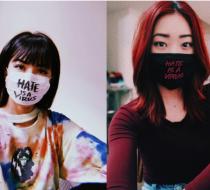#HateIsAVirus 1 Favorite
Activists fighting coronavirus-driven hate crimes are rallying on social media to turn masks into a symbol, rather than a target in racist attacks
Jeff Elder Apr 6, 2020, 2:03 PM
Activists against COVID-19-related hate crimes are leading a social media campaign using images of people in masks to fight back against attacks on Asian-Americans, which Congress and the FBI say are increasing.
Last week the Centers for Disease Control asked Americans to wear non-medical masks in public, which the activists see as an opportunity to spread their message that racist attacks related to the virus must stop. The US surgeon general previously urged Americans not to buy or wear masks. Activists say masks have become a powerful symbol of the controversy and conflicts involving the virus.
The activists are encouraging people to post photos of themselves in masks with the hashtag #HateIsAVirus to illustrate that wearing masks – and the virus itself – are in no way specific to any race, region, or nation.
Other hashtags, including #WashTheHate, #RacismIsAVirus, #IAmNotCOVID19, have protested hate crimes and hate speech, and condemned President Donald Trump's use of the phrase "Chinese virus." The president said last week that while the CDC is urging people to wear masks, he chooses not to.
Michelle Hanabusa, founder of UPRISERS, a Los Angeles-based clothing brand, sells masks emblazoned with the hashtag on her website. "I used to refuse wearing masks when I was younger to avoid being made fun of," she says. The hashtag "is meant to combat any of these stigmas."
Indeed, it appears that the mask has become something of a symbol.
"From the data available in public reporting, as well as ongoing studies and online conversation that we've been aggregating on racismiscontagious.com, it is clear that the mask has been a polarizing object," says Selina Guo, a New York advertising director at the firm ADMERASIA, which runs the website in collaboration with several non-profits. Masks were the top target sparking attacks after race and ethnicity, according to data on the site. "We are anxious to see if this announcement ultimately flattens or exacerbates these instances."
Racist attacks on the rise
Last week the FBI warned law enforcement across the country that hate crimes against Asians may increase due to the virus, according to a bureau report obtained by ABC News, "The FBI makes this assessment based on the assumption that a portion of the US public will associate COVID-19 with China and Asian American populations," ABC quoted the report as saying.
Two-dozen federal lawmakers from the Congressional Asian Pacific American Caucus (CAPAC), wrote a letter urging Congress "to help us prevent hysteria, ignorant attacks, and racist assaults that have been fueled by misinformation pertaining to the 2019 novel coronavirus." The letter cited an attack in February, on an Asian woman wearing a protective mask who was kicked and punched in a New York subway station.
Racist attacks on Asian-Americans have surged to about 100 per day, according to Democratic Rep. Judy Chu of California, leader of the caucus, who said on MSNBC last week that some victims were "assaulted just for wearing a face mask."
Organizers of the social media campaign aimed at stopping the attacks say the recent news events related to masks and attacks are a chance to communicate their cause.
"Masks have been a topic of huge debate. A lot of us have families in Asia, and our parents were worried that we weren't wearing masks. But then on the other hand they saw news reports about racist attacks on people wearing masks. The government urged people not to wear masks, and now it wants people to wear non-medical masks. That controversy shows what a powerful symbol they are," says Tammy Cho, cofounder of Executive Alerts, a social media startup acquired by the Meltwater public relations firm in 2015. Cho also cofounded BetterBrave, a nonprofit that gave tools and resources to employees who experience sexual harassment.
Cho and other leaders of the movement encourage people to post the hashtag on Instagram photos of themselves in masks to raise awareness of hate crimes, to discuss their own experiences with COVID-19 and racism, to share resources and links, and to support people who have been targeted in attacks.
Bryan Pham, who leads the 44,000-member Asian Hustle Network private group on Facebook, says the campaign "aims to increase awareness against racism and xenophobia while normalizing the need for Americans to wear masks to protect themselves from COVID-19."
Organizers estimate the hashtag has reached more than 4 million, as it has been adopted by influencers including the 1.6 million-follower Instagram account of the magazine Elle Korea.







